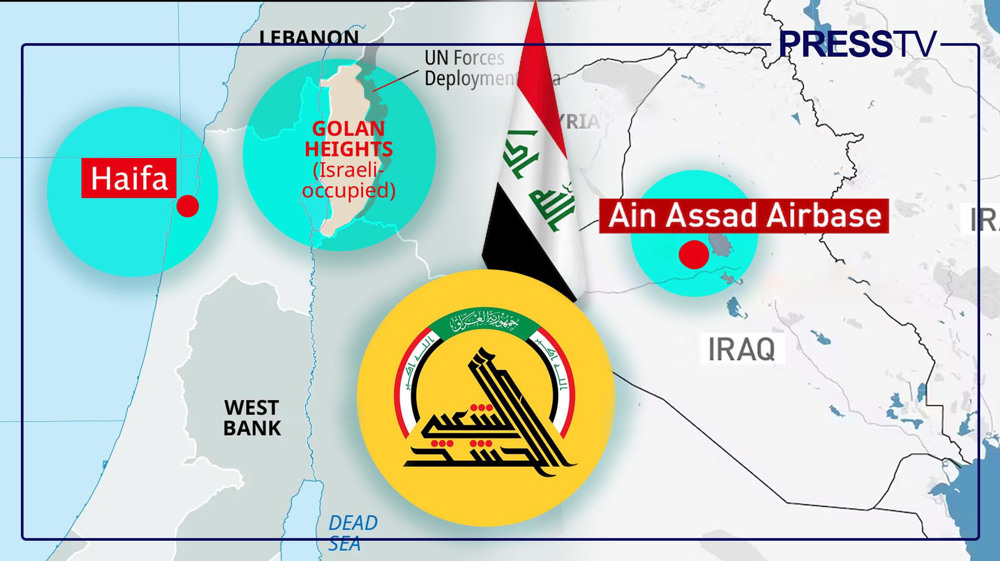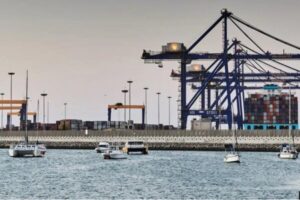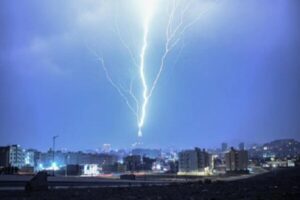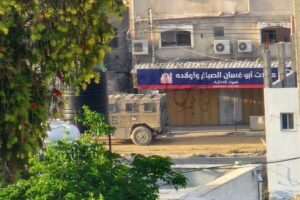By Wesam Bahrani
In yet another significant act of solidarity with the people of Gaza, the Islamic Resistance in Iraq on Sunday struck “a vital target in occupied Haifa” with an advanced long-range cruise missile, grabbing headlines and taking the embattled regime in Tel Aviv by another surprise.
In a statement, the Iraqi resistance emphasized that the operation was carried out because of “our ongoing support for people in Gaza,” who have been reeling under the Israeli aggression since Oct. 7.
The statement added that the operation was “in response to the massacres committed by the usurping entity against Palestinian civilians, including children, women, and the elderly.”
The Iraqi resistance, which has in recent months launched a string of attacks on US military bases in Iraq and Syria, said it will continue to hit enemy strongholds, warning that “more is yet to come”.
The concluding part of the statement was the most attention-grabbing.
Such is the stringent Israeli media censorship of the occupying regime’s war on the besieged Gaza Strip; it is difficult to speculate what vital infrastructure has been hit.
The Iraqi resistance struck Haifa with a long-range cruise missile, named al-Arqab, from Iraqi territory. The distance from Baghdad to Haifa is almost 1,000 kilometers.
According to sources, the launch of the missile took place closer to the Western Iraqi deserts. That is still roughly 600 kilometers away, or perhaps more, depending on the launch site.
It essentially means that Haifa, which is located in the northern part of the occupied territories, can expect attacks again from the Iraqi soil, the timing of which will be decided by the resistance.
More importantly, the long-range cruise missile traveled the same distance that can put Tel Aviv and all other Israeli-occupied Palestinian territories within the range of Iraqi fire.
On Monday, Iraq’s Harakat al-Nujaba resistance movement claimed responsibility for the strike, warning that Israel should await more crippling attacks in retaliation for its bloody war on Gaza.
“The Axis of Resistance is determined to disrupt US scenarios in the region and thwart the occupying Israeli regime’s schemes in Gaza,” Hussein al-Moussawi, spokesman for the group, said.
Should we be surprised that the Popular Mobilization Units (PMU), under which the Islamic Resistance in Iraq operates, possesses such world-class military technology?
The short answer is no.
The Iraqi government itself armed the PMU with the most capable military equipment from Baghdad’s weapons depots because it plays the most fundamental role of all the Iraqi armed forces.
The attack on Haifa points to the start of a new chapter by the Islamic Resistance in Iraq, in what is expected to be an even stronger show of support for the Palestinian resistance in Gaza and its people.
In this latest phase, we must expect an escalation in attacks on crucial Israeli infrastructure inside the occupied Palestinian territories, facilitated by the utilization of sophisticated long-range cruise missiles.
The Islamic Resistance in Iraq has made no secret of its iron-clad support and solidarity with the oppressed people of Gaza amid the Israeli regime’s indiscriminate bombings and inhumane siege.
It had also made no secret of its military operations against the Zionist regime and its Western backers, which has been completely evident in the past few weeks.
Shortly after the Israeli regime launched its war on Gaza on October 7, the Islamic Resistance in Iraq carried out a number of operations against Israeli interests and its main backer, the United States.
In late December, the Iraqi Resistance struck a vital target in the Eli-ad settlement, in the southern Israeli-occupied Syrian Golan Heights with drones.
Before targeting Eli-ad, the resistance also pounded the regime’s main offshore (occupied) Karish gas field in the eastern Mediterranean Sea with a direct hit, inflicting heavy damage.
That came after the Iraqi resistance struck a target in occupied Umm al-Rashrash (Eilat) with appropriate weapons and released images of the operation for the public.
The regime evacuated the settlers of Eilat, transforming the area into a military garrison. It made the site an ideal target for Iraq as well as Yemen, another Arab country that has upped the ante recently.
Yemen, Iraq and Lebanon’s Hezbollah resistance movement have carried out a series of operations against Israeli interests with a barrage of long-range drones and missiles.
At times, the goal has simply been to fire a barrage of missiles and drones to preoccupy the Israeli Iron Dome and Patriot Missiles. These calculated efforts have proven successful.
They effectively ease the pressure on the Palestinian resistance while at the same time drain out Israeli military resources, which have in recent months become extremely depleted.
The regime has killed more than 22,000 Palestinians since Oct. 7, the majority of whom have been women and children. Thousands more are missing, presumably dead under the rubble.
Among the countries and movements taking the lead in militarily pressuring the U.S. and its apartheid regime to end its inhumane attacks on Gaza, Iraqis have played a courageous role.
In Iraq, the resistance has targeted illegal American military bases on its territory as well as in Syria more than 110 times since the Israeli war against Gaza began three months ago.
Rockets, mortar shells, drones, and short and long-range ballistic missiles have all been used in these operations, leading to scores of casualties among US troops and collateral damage.
Now, the question that everyone is asking is: Why has the Iraqi resistance opened a new chapter?
Lately, the illegal US military occupation on Iraqi soil made a costly mistake by attacking sites belonging to the PMU, which means Washington and Tel Aviv have to pay the price.
Recent US attacks against affiliates of the PMU, including Kataib Hezbollah, and the recent deadly strike on the headquarters of Harakat al-Nujaba, which led to the assassination of one of its leaders in Baghdad, Haj Mishtaq, means the time is ripe for the resistance to expand its operations.
For context: In the eyes of the Iraqi resistance, there is no difference between the US military occupation of Iraqi soil and the Israeli occupation of Palestine. The liberation of the Palestinian territories begins with the expulsion of American troops from Iraq and the rest of the region.
While the Israeli regime commits horrendous crimes against humanity in Gaza, America is shielding, arming, funding and facilitating this madness of death and destruction campaign in the coastal strip.
Taking a closer look at the events unfolding in Gaza, it is, in essence, an American war on Gaza.
This direct complicity means that Washington has to pay the same price as the Israeli regime is paying for its massacres of civilians in Gaza. They are two sides of the same coin.
Whilst illegal US bases in Iraq and Syria are closer to the line of fire for the resistance, the indiscriminate Israeli attacks against women and children in Gaza have seen the PMU increasingly target the Israeli regime, the latest being Haifa.
What the Al-Aqsa Storm (or Al-Aqsa Flood) operation provided was an opportunity for the Iraqi resistance to strike at Israeli interests for the first time in history.
As pressure grows on the Iraqi government of Prime Minister Mohammad Shia’ al-Sudani to expel the illegal US forces, It has also opened a new window for the PMU to end the American occupation and avenge Washington’s assassination of its deputy leader Abu Mehdi al-Muhandis.
For the moment, the main goal of the resistance is to expand its scope of attacks against the Israeli regime in order to mount pressure on the apartheid occupation as well as the US.
And, as the Iraqi resistance warned after the Haifa attack, “more is yet to come”.
Wesam Bahrani is an Iraqi journalist and commentator.
(The views expressed in this article do not necessarily reflect those of Press TV.)




